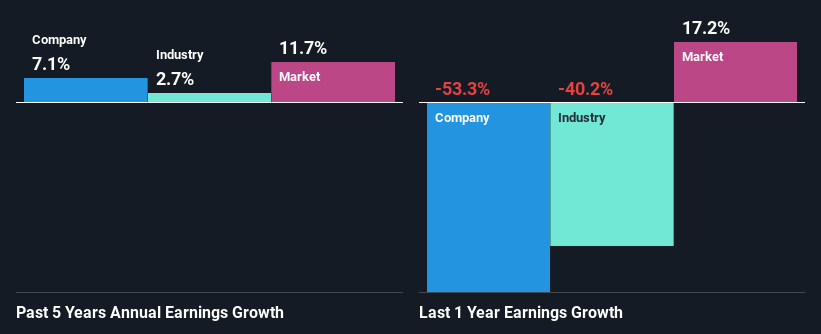MV Oil Trust's (NYSE:MVO) Stock Has Seen Strong Momentum: Does That Call For Deeper Study Of Its Financial Prospects?
MV Oil Trust (NYSE:MVO) has had a great run on the share market with its stock up by a significant 36% over the last three months. We wonder if and what role the company's financials play in that price change as a company's long-term fundamentals usually dictate market outcomes. Particularly, we will be paying attention to MV Oil Trust's ROE today.
Return on equity or ROE is an important factor to be considered by a shareholder because it tells them how effectively their capital is being reinvested. Simply put, it is used to assess the profitability of a company in relation to its equity capital.
Check out our latest analysis for MV Oil Trust
How Do You Calculate Return On Equity?
The formula for return on equity is:
Return on Equity = Net Profit (from continuing operations) ÷ Shareholders' Equity
So, based on the above formula, the ROE for MV Oil Trust is:
53% = US$5.6m ÷ US$11m (Based on the trailing twelve months to December 2020).
The 'return' is the profit over the last twelve months. That means that for every $1 worth of shareholders' equity, the company generated $0.53 in profit.
Why Is ROE Important For Earnings Growth?
So far, we've learned that ROE is a measure of a company's profitability. Based on how much of its profits the company chooses to reinvest or "retain", we are then able to evaluate a company's future ability to generate profits. Generally speaking, other things being equal, firms with a high return on equity and profit retention, have a higher growth rate than firms that don’t share these attributes.
MV Oil Trust's Earnings Growth And 53% ROE
To begin with, MV Oil Trust has a pretty high ROE which is interesting. Additionally, the company's ROE is higher compared to the industry average of 12% which is quite remarkable. This likely paved the way for the modest 7.1% net income growth seen by MV Oil Trust over the past five years. growth
As a next step, we compared MV Oil Trust's net income growth with the industry, and pleasingly, we found that the growth seen by the company is higher than the average industry growth of 2.7%.
Earnings growth is an important metric to consider when valuing a stock. The investor should try to establish if the expected growth or decline in earnings, whichever the case may be, is priced in. By doing so, they will have an idea if the stock is headed into clear blue waters or if swampy waters await. If you're wondering about MV Oil Trust's's valuation, check out this gauge of its price-to-earnings ratio, as compared to its industry.
Is MV Oil Trust Making Efficient Use Of Its Profits?
The high three-year median payout ratio of 92% (or a retention ratio of 8.4%) for MV Oil Trust suggests that the company's growth wasn't really hampered despite it returning most of its income to its shareholders.
Additionally, MV Oil Trust has paid dividends over a period of at least ten years which means that the company is pretty serious about sharing its profits with shareholders.
Summary
Overall, we feel that MV Oil Trust certainly does have some positive factors to consider. Namely, its high earnings growth, which was likely due to its high ROE. However, investors could have benefitted even more from the high ROE, had the company been reinvesting more of its earnings. As discussed earlier, the company is retaining hardly any of its profits. Until now, we have only just grazed the surface of the company's past performance by looking at the company's fundamentals. So it may be worth checking this free detailed graph of MV Oil Trust's past earnings, as well as revenue and cash flows to get a deeper insight into the company's performance.
This article by Simply Wall St is general in nature. It does not constitute a recommendation to buy or sell any stock, and does not take account of your objectives, or your financial situation. We aim to bring you long-term focused analysis driven by fundamental data. Note that our analysis may not factor in the latest price-sensitive company announcements or qualitative material. Simply Wall St has no position in any stocks mentioned.
Have feedback on this article? Concerned about the content? Get in touch with us directly. Alternatively, email editorial-team (at) simplywallst.com.

